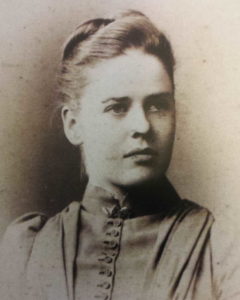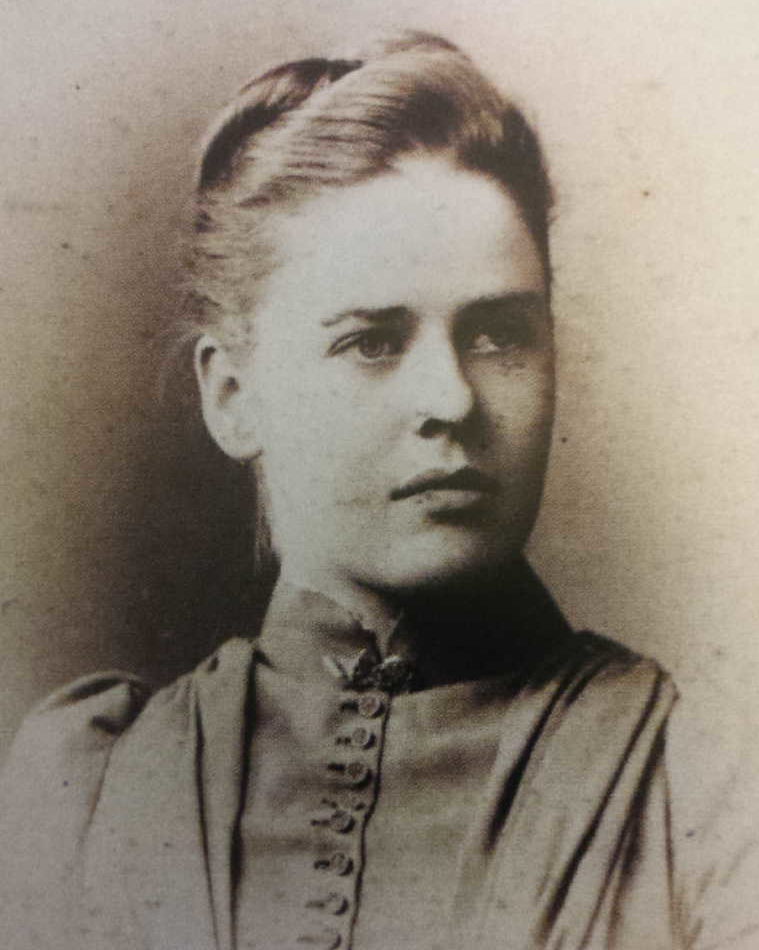
Edith Neild (1874 – 1927) in 1891. Image courtesy John Neild.
Edith Neild M.B. L.R.C.P. L.R.C.S. L.F.P.S (15 January 1874 – 29 August 1927) was a pioneering British homeopathic doctor. Edith Neild was the first female member of the British Homeopathic Society, elected in 1898. She was a third assistant officer resident at the London Homeopathic Hospital, and an Honorary Physician at the Tunbridge Wells Homeopathic Hospital.
Edith Neild was born in Plymouth in 1874, the eldest daughter of Dr. Frederick Neild and his wife Annie Miller (1846 – 1900).
Neild was educated at the Tunbridge Wells High School (1881 – 1945), before studying medicine at Edinburgh School of Medicine for Women, founded by Sophia Jex-Blake in 1886. In her first year there Neild won the third medal for chemistry, and the second medal for practical chemistry. In 1896 Neild also passed the University of London Intermediate Examination in Medicine with a first class grade.
Edith Neild graduated from Edinburgh in 1898 with the Scottish Triple Qualification in medicine: Licentiates from the Edinburgh Royal College of Physicians and Royal College of Surgeons, and a Licentiate from the Faculty of Physicians and Surgeons in Glasgow. Two years later, in 1900, she received her M.B. from the London School of Medicine for Women.
In 1899 Edith Neild was appointed as a third resident medical officer with an emphasis on gynecological department at the London Homoeopathic Hospital. This new position was a response to the increased demand for treatment at the hospital, and was also noteworthy in Neild being the first woman physician to occupy such a role at the hospital. It was also noted that she was the first woman to contribute an article to the hospital annual report.
While working at the London Homeopathic Hospital, in 1904 Edith Neild was among the many staff members who donated their time to the London Missionary School of Medicine (MSM). This school had been established the previous year by the British Homoeopathic Association. Neild was recorded as a lecturer in obstetrics for the MSM.
In addition to her roles at the London Homeopathic Hospital, by 1903 Edith Neild had also joined her father and George Henry Burford as a Consulting Physician at the Tunbridge Wells Homoeopathic Hospital on Upper Grosvenor Road.
In 1907 Edith Neild won the Dudgeon scholarship to attend a post-graduate course in homeopathic materia medica and therapeutics at Boston University School of Medicine. On her return to England later that year she became seriously ill with scarlet fever.
Edith Neild was an active participant in the homeopathic medical community. In July 1911 she attended the 8th Quinquennial International Homoeopathic Congress where she delivered a paper on accidental hemorrhages to the Obstetrical Section.
During WWI both Edith Neild and her father, Frederic, as Quakers contributed to the War Victims Relief Committee of the Society of Friends.
Edith Neild also supported other non-medical organizations, including the National Vigilance Association and International Bureau for the Suppression of Traffic in Women and Children.
Edith Neild attended a meeting of homeopathic doctors in December 1918 where she participated in a discussion concerning homeopathic medical treatment of the influenza pandemic that was then raging:
The sputum is diluted to three with normal saline. “I give three doses the first night, and if the temperature rises again the second night also. I have sometimes had to give it a third time….” The British Homoeopathic Journal. December 1918, Vol. 8, No. 12.
In 1924 Edith Neild conducted an enquiry into the history of a case involving a baby girl, born in 1920, who was admitted into the Victoria Hospital for Children in 1922 with encephalitis, but died there a few months later. Neild’s research was utilized in a study by C. Da Fano and H. Ingleby at Kings College, London, and published as “Histopathological Observations in an Unsuspected Case of Chronic Epidemic Encephalitis in a Young Child,” in The Journal of Pathology and Bacteriology, Vol. 28, No. 4.
In the 1920s Edith Neild’s address was the Tunbridge Wells Homeopathic Hospital at 32 Church Road, Tunbridge Wells.
Edith Neild died at Shaugh Cottage in nearby Hartfield, Sussex, on 29 August 1927. She was buried alongside her father Dr. Frederick Neild, her mother Annie and, later, her sister Jane, at the Kent and Sussex Cemetery and Crematorium.
Select Publications:
Suggestions in Preparing for Adolescence (1924), published in French as Conseils pour la préparation des enfants à leurs années d’adolescence (1925).
Of Interest:
Edith Neild’s father, Frederic Neild M.D. C.M. L.R.C.P. (27 August 1847 – 29 January 1926), was an homeopathic physician who founded the Plymouth, Devon and Cornwall Homeopathic Dispensary and Cottage Hospital, and later served as Consulting Physician at the Tunbridge Wells Homeopathic Hospital.



Leave A Comment